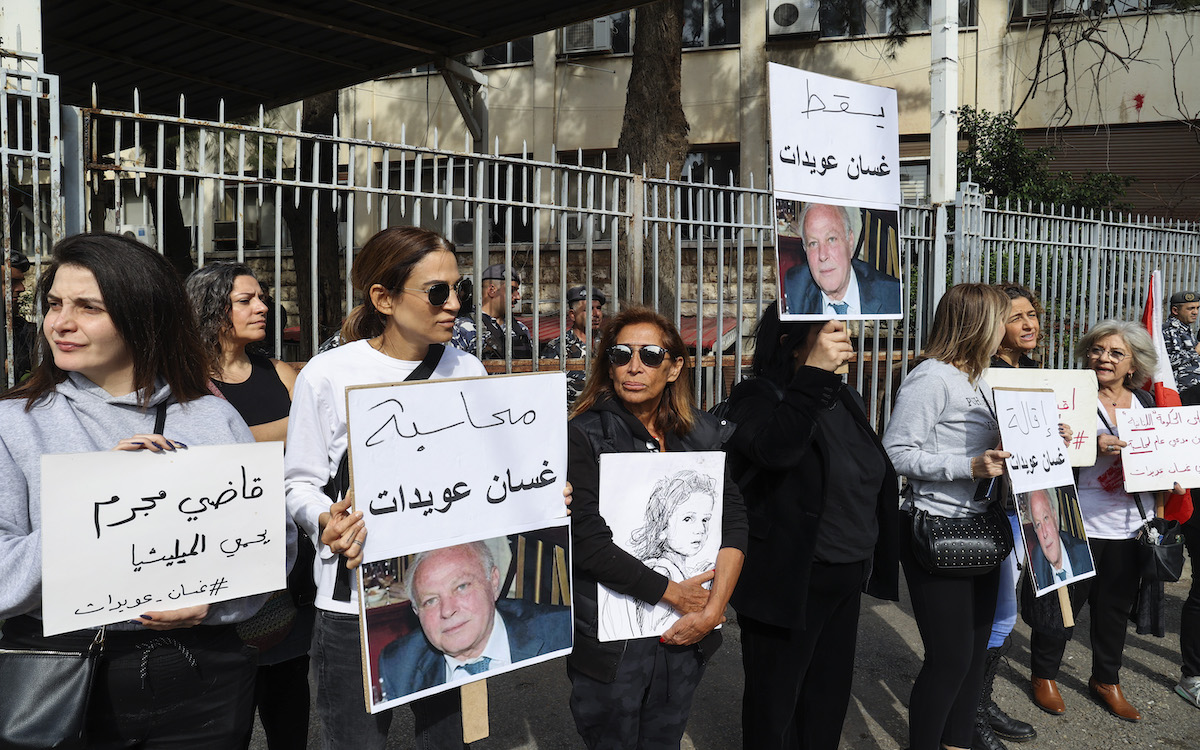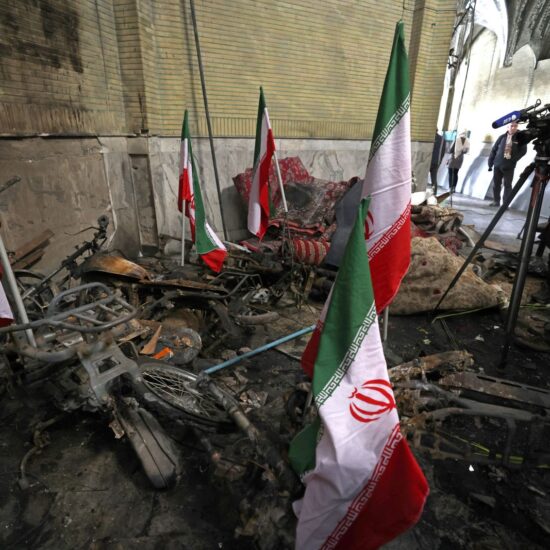
Lebanon’s judiciary has long been viewed as politically biased and as a tool used by politicians to silence their critics. Real justice has been a rarity.
For nearly two and a half years, the families of the victims of the August 4 Beirut Port explosion have been demanding that those who allowed it to happen be held accountable – only for the investigation to be blocked every step of the way.
That is why it came as a shock when Judge Tarek Bitar, the lead investigator into the explosion, announced the resumption of the case last Monday despite being subjected to various court cases in attempts to obstruct his process. Bitar also met with a French judicial delegation in Beirut the previous week as part of their probe into the deaths of two French citizens in the explosion.
But Bitar’s announcement was almost immediately met with opposition by the political elite and some in the judiciary.
Bitar charged eight new people in the investigation, including public prosecutor Ghassan Oueidat, security chief Maj. Gen. Abbas Ibrahim, and former Prime Minister Hassan Diab, but they made it very clear that they were not going to listen to anything that Bitar had to say.
Oueidat responded by claiming that Bitar could not continue his investigation, charging him with “rebelling against the judiciary allegedly to “prevent sedition.”
For those who support Bitar, it is hard to view this as anything other than another attempt by the accused to disrupt the investigation and avoid justice – especially since the person who filed the charges against Bitar is, once again, someone who is being charged by the lead investigator.
Bitar ignored his summons for questioning and flat-out refused to acknowledge Oueidat’s case, arguing that the public prosecutor had “no authority to charge me.”
This has led to an internal battle within Lebanon’s judiciary as to what should happen next.
Should Bitar’s investigation be suspended once more? Should he be removed? Who has authority over Bitar?
The judiciary is split between those who oppose the judge and those who support him, meaning that, for the time being, Bitar could be secure in his position.
But the country’s judiciary has long been politicized, with politically appointed judges who hold allegiances to specific leaders.
So all it takes is one ruling, and the investigation may not only be stalled, it could be killed for good.
In Lebanon
Run: When Oueidat issued his order against Bitar, he also ordered the release of the individuals who had been detained since the start of the investigation.
This led to the release of controversial figures like Badri Daher, the customs official who has been widely blamed for the port explosion, and also saw Ziad Auf, a port official, walk free.
The ink on the order had not even dried before Auf, who is a dual Lebanese-American national, boarded a flight to the United States despite there being a travel ban against him.
The US had previously threatened sanctions if Auf was not released. Following his release, he was escorted by US officials to the airport so that he could leave the country.
The turbulent lira: On Thursday, January 19, the lira reached the milestone of 50,000 to $1.
The week that followed, though, demonstrated how unstable the currency had become and how much worse things could get in the country.
Over the span of a week, the lira increased by at least 2,000 every day, culminating in a record high of around 63,500 to $1.
The #lira is trading at well over 63,000. Currently, the rate stands at around 63,500 to $1. #Lebanon #لبنان #ليرة #دولار
— Nicholas Frakes | نيكولاس فريكس (@nicfrakesjourno) January 27, 2023
Since then, it has gone down a bit and has been fluctuating between 57,000 and 60,000.
Running on aid: The US has earmarked $72 million in aid for the Lebanese security forces so that the soldiers and police could continue to earn their wages.
In addition to providing the security forces with their normal wages, it will also allow them to receive an extra $100 per month for the next six months.
The US has been the biggest supporter of the Lebanese Army, providing it with an estimated $3 billion in aid since 2006.
While this aid will help the security forces for the next few months, as the economic crisis continues to worsen, once the money runs out, it will hit them even harder.
A new deal: When Lebanon and Israel signed a maritime border agreement in October 2021, it opened up the possibility for Lebanon to become a major fuel exporter in the region with the Qana Prospect.
However, the Russian company Novatek, which was one of the three companies who had agreed to help with the exploration and extraction of any significant fuel found off the coast of South Lebanon, resigned from its position in September. Now, a new signatory was needed to work alongside French Total and Italian ENI.
That is where state-owned Qatar Energy stepped in, signing the deal with Lebanon, Total and ENI on Sunday, allowing for the exploration of Block 9 to move forward.
Exploration is expected to start later this year.
NGO or Hezbollah front: Green Without Borders, an NGO operating in South Lebanon, has been operating since 2009, planting an estimated two million trees according to the organization.
But according to Israel and US, though, it is actually an arm of Hezbollah working to help the Shiite group cover up its military activities and set up Hezbollah outposts along the border, which, if true, would be a violation of UN Resolution 1701.
While the NGO denies any affiliation, alleged Hezbollah activity has been documented at outposts set up by the environmental organization.
UNIFIL officials who said that they have had the opportunity to monitor the areas where Green Without Borders operates, however, have said that there has been no “breach of 1701.”
Bassil for president: Three months since Michel Aoun left the presidency, Lebanon is still without a president.
In a recent speech, his son-in-law and leader of the Free Patriotic Movement Gebran Bassil hinted that he could announce his candidacy for president soon if there continues to be a deadlock, all the while calling into question the alliance between the FPM and Hezbollah.
For years, Bassil has widely been expected to run for the presidency, but he has increasingly lost support and does not seem to be favored as a candidate as he might have been prior to the economic crisis and popular uprising in 2019.
He has also increasingly spoken out against the 2006 alliance between his party and Hezbollah, calling for a new agreement to be made. But this is something that is unlikely to happen as the FPM, and more so Bassil, need Hezbollah’s support to remain significant players in the game of Lebanese politics.
More ineffective actions: On Tuesday, January 24, the US announced sanctions against Hassan Moukallad, the owner of CTEX Exchange, along with his sons Rayyan and Rani for allegedly helping to finance Hezbollah.
The @USTreasury announced sanctions against Hassan Moukallad, his sons Rayyan and Rani and his exchange company CTEX Exchange for allegedly helping to finance #Hezbollah. #Lebanon #لبنان #حزب_الله https://t.co/q8ENXps67W
— Nicholas Frakes | نيكولاس فريكس (@nicfrakesjourno) January 24, 2023
The US has implemented a large number of sanctions since it designated Hezbollah as a foreign terrorist organization in 1997 in the hopes of crippling the group and limiting its local and international capabilities and actions.
However, this has mostly failed, and Hezbollah has continued to operate unimpeded.
In the region
Lighting the fuse: 2022 was the deadliest year for Palestinians since the United Nations began keeping records in 2005, with over 150 Palestinians killed.
The tensions from the previous year have also carried over int0 2023, with Israeli raids in the West Bank and Palestinian attacks on Israeli soldiers adding to the body count.
Then, on January 26, the Israeli military held a massive raid in Jenin, a city and refugee camp in the northern West Bank, which saw 10 Palestinians killed, including a 61-year-old woman.
Israel described the operation as a “counterterrorism operation” against Islamic Jihad militants operating in the area. Jenin was a hotbed for violent confrontations between Palestinians and the Israeli military in 2022.
An escalation of violence followed the deadline raid.
The following day, on Holocaust Remembrance Day, seven people were killed in a shooting near a Jerusalem synagogue in what the militant group Hamas called “a quick response to the Jenin massacre, and is evidence of the vitality and readiness of the resistance.”
The shooter, 21-year-old Khairy al-Qam, was killed soon after.
Then, on January 28, there was another shooting in Jerusalem that injured two Israelis.
The gunman was a 13-year-old boy who was shot and injured and arrested following the shooting.
In response to the recent shootings, Israeli Prime Minister Benjamin Netanyahu has said that he will loosen gun restrictions for Israelis and said that “Our response will be strong, fast and accurate. Whoever tries to hurt us, we will harm them and anyone who helps them.”
Another Palestinian man was killed on Saturday night after he allegedly was holding a handgun near a West Bank settlement.
Furthermore, there have been around 144 Israeli settler attacks on Palestinians across the West Bank on Saturday.
US Secretary of State Antony Blinken is visiting Israel and Palestine this week and is hoping to be able to cool the boiling tensions.
While the US and Egypt have both agreed to work together to broker peace, it is unlikely to do much as Palestinians feel little hope amid the ongoing occupation and repression, while far-right and extremist Israelis have felt increasingly emboldened by the new extreme-right Netanyahu government.
Israel strikes Iran: Israeli military operations in Iran are nothing new, as the country has continued to try to prevent Iran from acquiring a nuclear weapon and cripple its regional activities.
So when it came out that an explosion in the central Iranian city of Isfahan on Saturday was caused by exploding drones used by Israel, Iran quickly pointed the finger at Israel, something that the Iranian government often does when anything happens in the country.
While Iran claimed that it shot down all of the drones before they could do any damage, the military facility targeted is used for missile production, particularly the Shahab medium-range missile.
Israel rarely acknowledges its military actions, but they are known to have carried out many operations inside Iran, such as the 2020 assassination of Iranian nuclear scientist Mohsen Fakhrizadeh.
The truth comes out: The Organization for the Prohibition of Chemical Weapons released a report on Friday stating that the Syrian government was responsible for the 2018 chemical weapons attack on Douma.
The majority of the international community immediately cast blame on the Syrian government as being the culprit, but the OPCW’s report is the first official in-depth findings that directly point the finger at the Syrian government.
The Syrian military has carried out multiple chemical weapons attacks on rebel-held and opposition-held cities after the start of the civil war in 2011. Syria and its ally Russia have long disputed these claims and have pushed a disinformation campaign that claims that the attacks were staged by Syrian rebels and opposition groups, particularly the Syrian Civil Defence, more commonly known as the White Helmets.
After the Syrian government used Sarin gas in 2013, the US government worked with Russia to dismantle the Syrian government’s chemical weapons arsenal and capabilities. While the Syrian government claimed that all of its chemical weapons were removed, it has continued to use them in the years since they were supposedly dismantled.
What we’re reading
Political interference: Lebanon’s Central Bank governor Riad Salameh is under investigation in Europe and Lebanon for financial-related crimes. Samara Azzi wrote about how Lebanon’s caretaker prime minister, Najib Miakti, has worked to interfere in the investigations.
Schools shuttered: The economic crisis has affected nearly everyone in Lebanon, young and old. Public school teachers are holding a strike, now in its fourth week, that has left schools closed. NOW’s Dana Hourany looked at how the economic crisis led to teachers walking out.
The squad: So far, four people have been executed after they took part in the national uprising in Iran. The Washington Post’s Miriam Berger looked at the small group of hardline judges who are trying these cases and dealing out severe judgments as the government attempts to scare people from going to the streets.
Lebanon+
Podcasts: “Change” MPs are still holding a sit-in in Parliament until a new president can be elected. Ronnie Chatah spoke with MPs Najat Aoun Saliba and Melhem Khalaf on Instagram Live for the Beirut Banyan, where they discussed the Beirut Blast investigation, electing a president, and institution building.
How do we live together? Mouin Azouri and Médéa Jaber spoke with historian Charles al-Hayek in the latest episode of Sarde after dinner about the history of Christian and Muslim coexistence in the Middle East.
Until next week, follow NOW Lebanon on Twitter, Instagram, Facebook, and LinkedIn, and subscribe to our weekly newsletter. And stay safe!








